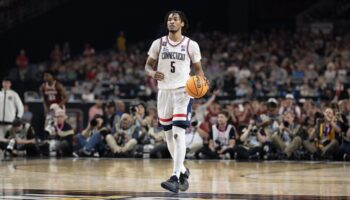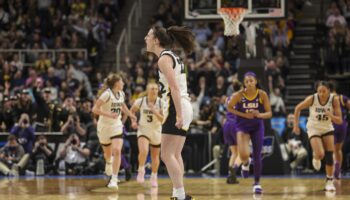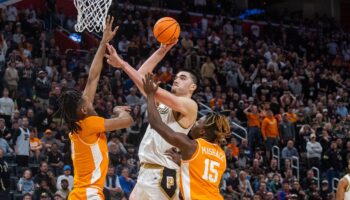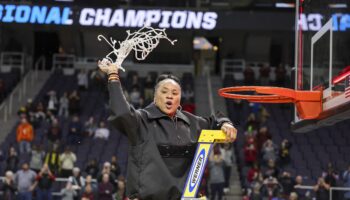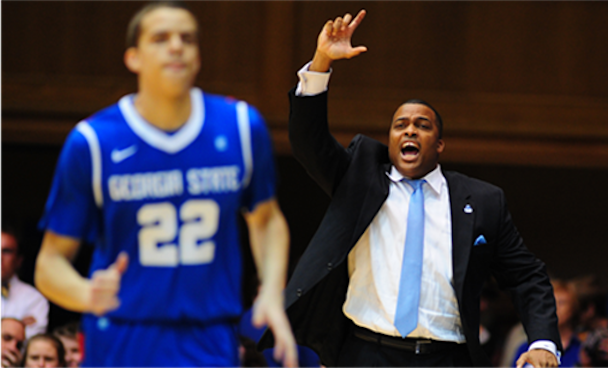
Take care of the little things and big things will happen. The 2014 Georgia State basketball team has reaped the benefits of the axiom preached diurnally by the voice of coach Ron Hunter to the tune of almost unprecedented success on the court.
The feet of Ron Hunter have benefitted thousands more worldwide– and also keep the winning in perspective.
In his third year in Atlanta, Hunter, who came to national prominence in 2008 when he, at the request of Samaritan’s Feet, walked the sidelines barefoot for a game to raise awareness for the charity which collects shoes for impoverished children around the world, has Georgia State on the verge of winning a conference championship in its first season in the Sun Belt Conference. Winning 17 out of the past 18 games has been spurred on by a trioka of sure-handed guards – one of them being Hunter’s own son – each able take over a game single-handedly, as well as an offense that has averaged almost 80 points per game for a large part of the season.
Last week, we spoke with Hunter about the different parts of his team that make the Panthers one of the best mid-major outfits, as well as a dangerous squad when the calendar turns to March in a couple of days.
The Little Things
Just recently, the Panthers went on a school-record 14-game winning streak, the sixth longest in the country by the time it ended on Feb. 15. Its offense has been the catalyst all season, with the Panthers ranking fifth in the NCAA in offensive efficiency (1.144 points per possession) according to teamrankings.com. More impressively, GSU has committed the second-fewest turnovers in D-I (230) and rank fifth nationally in assist-to-turnover ratio (1.61) and fourth in free-throw percentage (77.3). Hunter insists the big things happening for his team are due to the constant stress he puts on mastering the little things, with the biggest little thing being taking care of the ball.
“If you make free throws and you don’t turn the ball over, you’re going to give yourself a chance to win the game every night, regardless of how you shoot it,” Hunter said. “There have been nights when we’ve shot 38 percent and teams have outrebounded us by 21, but we won the game because we won the free throw war and we were able to take care of the basketball. If you turn it over only five or six times a game, it gives you a chance to win every time out. We put a huge focal point on taking care of the basketball and making free throws. We’ve preached that from day one and our guys have really bought into that.”
[visualizer id=”2643″]
(*Bullet points on map identify all 27 games played this season; only opponents in the odd-numbered games are listed on timeline.)
Cast Of Thousands
Georgia State boasts four players who have scored over 1,000 points in their college career: guards R.J. Hunter (Ron’s son, who is currently fourth in the Sun Belt with a 19.3 scoring average), Ryan Harrow, Devonta White and forward Manny Atkins. The number of guards doesn’t allow for Hunter to field a big lineup, but its versatility in the backcourt is one of the team’s biggest strengths, if not its biggest. “We really start two point guards and then we start a coach’s kid and they handle the ball 90, 95 percent of the time,” Hunter said. “And then our four-man (Atkins) is a fifth-year senior. So you’re talking about veteran guards who understand how to play, with two of them being point guards with Ryan (Harrow) and Devonta (White).”
Almost as important as bringing that scoring punch and balance, the quartet instills a high level of steadiness in any situation. “Not only are they 1,000-point scorers, they are seniors and they are guards who understand how to play. That’s what makes for dangerous teams in the tournament: veteran guards who can score and don’t turn the ball over. There are not a lot of teams in the country that have that.”
A Second Chance
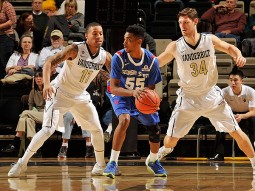
Like a successful manager in top-flight European soccer, Hunter has become a master of building his teams using transfers. Atkins (Virginia Tech), a native of Tucker, Ga., arrived two seasons ago and started his Panther career last year, while Marietta, Ga., native Harrow (Kentucky via N.C. State) and starting frontcourt player Curtis Washington (USC) became eligible to play for GSU this season. Hunter has been able to turn dissatisfaction, homesickness and other circumstances experienced by players looking to jump ship into a successful business model.
“Transfer rates have been higher than they have been in the past 20 years, so if you aren’t in the transfer business, then there’s something wrong,” said Hunter, who applied the same strategy when he was coach at IUPUI (Indiana University-Purdue University Indianapolis) prior to coming to Atlanta. “You almost have to keep scholarships in your pocket right now because not only do they transfer from college, they transfer in high school, they transfer AAU teams, they transfer everything. It’s just part of the culture of, ‘If you’re not happy, you leave.’ Whether you like it or not, you better be able to deal with that, and that’s become a big part of recruiting.”
It Wasn’t Always So Peachy.
Before the 14-game run, Georgia State stood at 3-6, and already was at a crossroads in their season. A lot was expected from the Panthers after coming over from the Colonial Athletic Association, and even after the team started to hit their stride, Hunter made sure to remind them from whence they came.
“I mention it every day that we started 3-6, and we don’t want to go back there,” Hunter said, explaining how his team has stayed grounded in the midst of the school’s unprecedented winning streak. He continued: “I thought we didn’t handle expectations well early, and I thought that in November, we were worrying about March. Now what we do is worry about the next day. Worry about the next game and the next practice. Don’t worry about the other stuff that you can’t control. We needed to go through that to have the success that we’re having right now.”
Relax! It’s Only Basketball.
Since 2008, Hunter has been very active with Samaritan’s Feet, taking time almost every summer to travel (and a few times traveling with his team) to different parts of the world, delivering shoes and washing the feet of underprivileged children who can’t afford footwear and prone to foot infections. Along with those charitable and spiritual missions, he usually walks the sidelines barefoot at least one game a season to call awareness to the cause, as he did in the Jan. 18 game vs. Arkansas-Little Rock. Over the years, his efforts alone have raised over 250,000 pairs of shoes, and when he and his team traveled to South Africa in the summer of 2012, it became an epiphanic experience to his players, including those who grew up in tough inner-city neighborhoods.
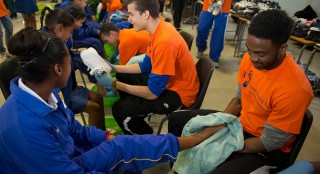
“Some of our kids that thought they might have grown up poor really saw what poor was like,” Hunter asserted. “They were able to see somebody that had it a whole lot worse than what they did. And as we talk about washing the feet of kids and giving them shoes and the things that we do, I’d say it’d be a shame that if that didn’t change you when you came back here, then there’s something wrong with your soul.”
The tangible impact it made on his players, Hunter continued, is evident in the way they now conduct themselves on and off the court. “Even when we go through tough times now, our kids will talk about, ‘Man, remember when we were in South Africa and saw those kids that really had nothing?’ and they bring that up on their own. So it changed every single one of those young men.”
As much as Georgia State’s success on the court gives him satisfaction, Hunter maintains that helping the less fortunate will always be the bigger payoff.
“That means more to me than any win or any Final Four or any tournament or anything like that. When you can help children, that supersedes anything that I could ever do in coaching.”

